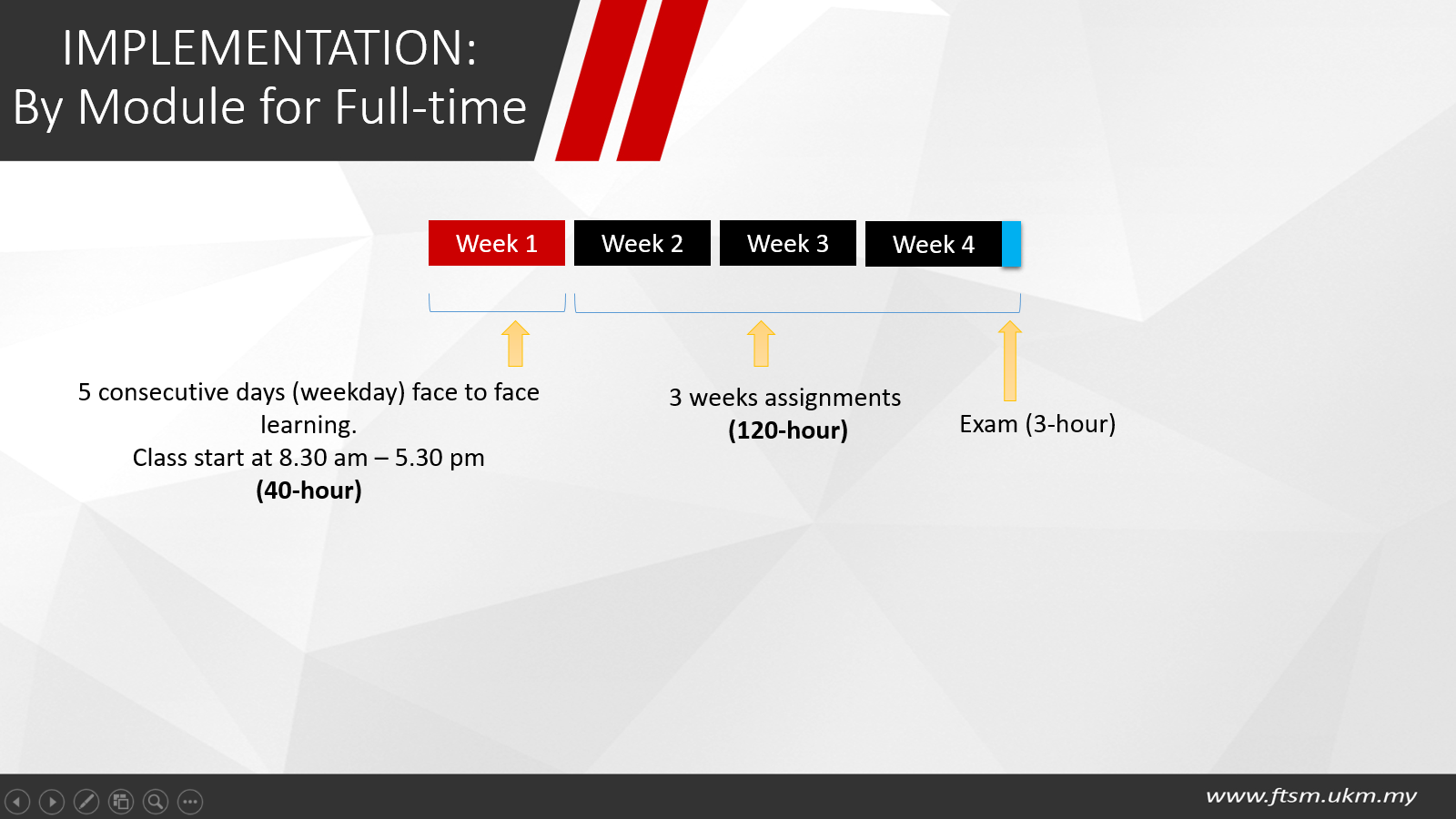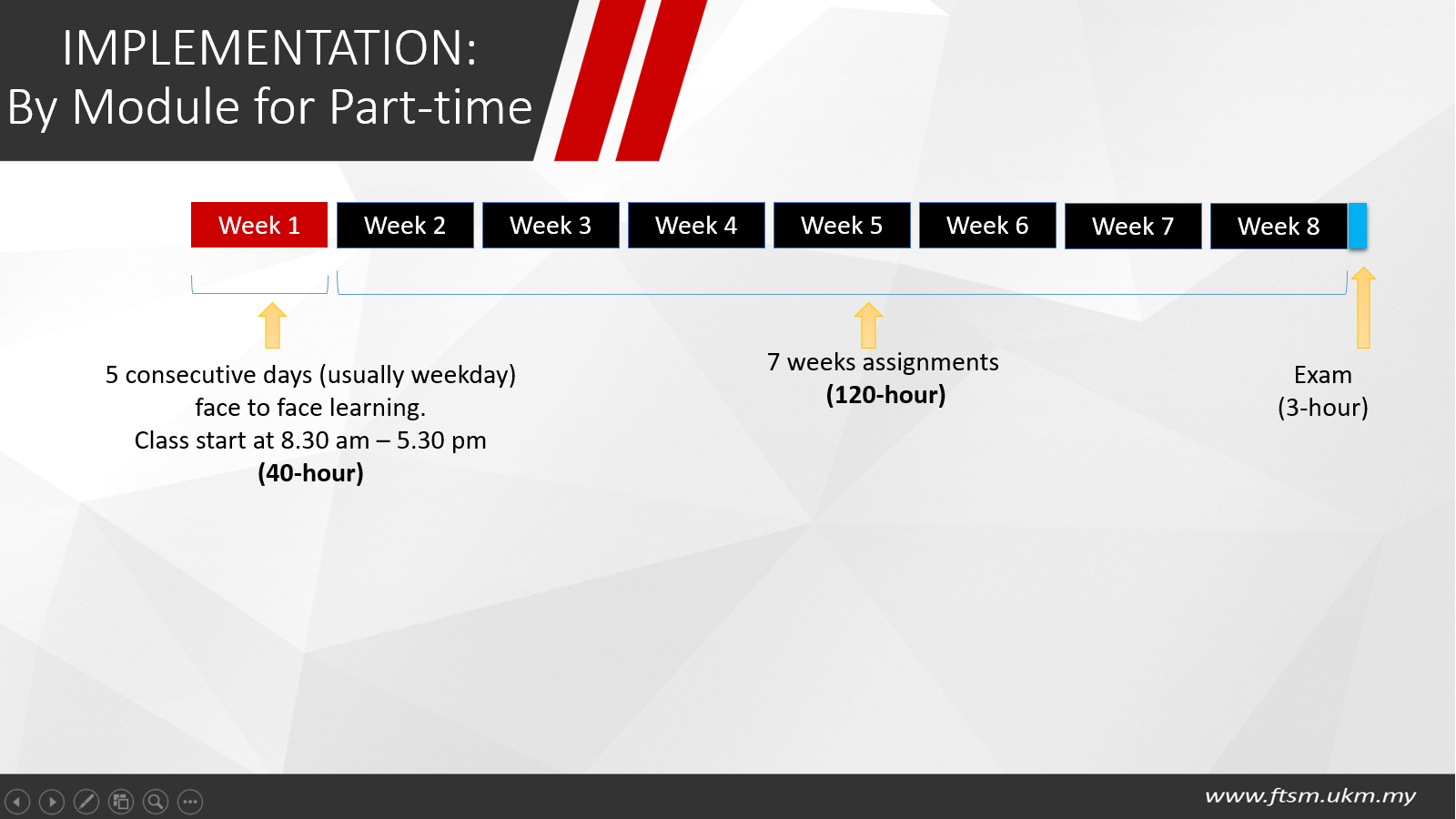
Faculty of Information Science and Technology in Universiti Kebangsaan Malaysia offers various computing programmes. However, the Master of Data Science is uniquely designed for special individuals and their organization’s needs.
We collaborate with the Malaysian Administrative Modernisation and Management Planning Unit (MAMPU) to ensure best knowledge delivery. In addition, we are currently Hortonworks Academic Partner.

Mode of Study
Accreditation Status by
Admission Requirement
- A Bachelor's Degree in computing from the National University of Malaysia or any other higher education institution approved by the Senate with a minimum Cumulative Grade Point Average (CGPA) of 2.75; OR
- A Bachelor's Degree in computing from the National University of Malaysia or any other higher education institution approved by the Senate with a CGPA of minimum 2.50 but not reaching 2.75, can be considered subject to internal assessment; OR
- A Bachelor's Degree in computing from the National University of Malaysia or any other higher education institution approved by the Senate with a CGPA below 2.50 with at least 5 years of working experience in the field of computing can be considered; OR
- A Bachelor's Degree in a different field from the National University of Malaysia or any other higher education institution approved by the Senate with a minimum CGPA of 2.75, AND have no less than 5 years of working experience in the field of computing, AND need to complete prerequisite courses set by the program; OR
- Other qualifications equivalent to a Bachelor's Degree and have other qualifications or experience approved by the Senate.
TOEFL/IELTS/MUETS/CEFR
For international candidates, requirements for English Language is:
- minimum 550 (PBT) / 46-59 (iBT) score for the Test of English as a Foreign Language (TOEFL) OR
- 5.5 for the International English Language Testing System (IELTS) OR
- Band 3 for Malaysian University English Test (MUET) OR
- level B2 for the Common European Framework of Reference for Languages (CEFR/CEFRL)
as a prerequisite for entry into graduate programmes at FTSM.
Malay Language Requirements
Malay Language Courses (4 units)
All international students are required to follow two (2) Malay language courses equivalent to 4 units offered by the Citra Centre. Exemptions can be given to candidates who have taken and passed Malay language courses organized by other bodies recognized by the UKM Senate.
Programme Structure
Learning Outcomes
The programme is designed to produce graduates who will be able to:
- Analyse and evaluate data in depth
- Support the development and deployment of innovative big data platforms for advanced analytics
- Solve problem with innovative solutions for business purpose
- Understand data and information modelling to design, construct and evaluate database and data warehouse for structured and unstructured data
- Apply data analysis method and technique for changing raw data into valuable and useful information
Structure And Content
| Structure | Course Credit | Course |
| Compulsory | 24 credits (equivalent to 6 courses) |
|
|---|---|---|
| Electives | 4 credits (equivalent to 1 courses) |
|
| Project | 12 credits |
|
| Total | 40 Credits |
Duration of Study
- Full Time : 1 - 2 years
- Part Time : 2 - 4 years
Teaching Approach
By considering enthusiastic executives as our main audience, the courses are designed in such a way that face to face learning is done in 5 full days which include active learning, lab activities, discussion and case studies. Whilst the assignments need to be completed in the next 3 weeks for Full-time or 7 weeks for Part-time students.


List of Courses
TC6424 Fundamental of Data Science
This course aims to introduce the fundamental techniques of data science and relating it to some current research issues, and to evaluate some current and potential applications. It covers standard theories, models and algorithms, discussing competing solutions to problems, describing example systems and applications, and highlighting areas of open research.
TR6124 Statistical Methods for Data Analytics
This course discusses important techniques in data analysis. Descriptive and inferential statistics will be applied in analysing and interpreting to better inform strategic decisions.
TTP6234 Unstructured Data Analytics
This course aims to introduce the fundamental techniques of natural language processing and text analytics and relating them to some current research issues. It covers standard theories, models and algorithms, discussing competing solutions to problems, describing example systems and applications, and highlighting areas of open research. Among the topics discussed are syntax, semantic, and feature extraction. These are required to overcome problems of part-of-speech tagging, syntactic parsing and text classification. Algorithms and methods used will be corpus-based processing, knowledge-based techniques and statistical methods. Applications involving NLP techniques such as information extraction and sentiment analysis will also be discussed.
TTS6024 Information Modeling and Databases
This course introduces database concepts and technologies, and provides the practical foundation in data modelling, database development, structured query language (SQL), database application programming, and database administration. This course is designed for students with little or no prior experience in using databases.
TU6434 Big Data Analytics and Management
The goal of this course is to familiarize students with the fundamental concepts of Big Data management and analytics so that they will become competent in recognizing challenges faced by applications dealing with very large volumes of data as well as in proposing scalable solutions for them; and will be able to understand how Big Data impacts business intelligence, scientific discovery and society. This course brings together several key information technologies used in manipulating, storing, and analyzing big data. This course will focus on how to handle, data mine and analyze very large amounts of data or Big data. This course is also aimed to equip students with the technical capability to devise scalable solutions to various classes of big data processing problems. This course will allow the students with an opportunity to work on a real-world data problem by (I) implementing large-scale data processing solutions using data-centric computing tools of their choice; (II) deploying their implementations on a compute cloud service; (III) benchmarking their solutions. MapReduce and NoSQL will be used as tools/standards for creating parallel algorithms that can process very large amounts of data. NoSQL storage solutions will be analyzed for their critical features: speed of reads and writes, data consistency, and ability to scale to extreme volumes. The course material will be drawn from textbooks as well as recent research literature. We review Hadoop, an open source framework that allow us to cheaply and efficiently implement MapReduce on Internet scale problems. This course also covers related tools that provide SQL-like access to unstructured data: Pig and Hive.
TC6444 Machine Learning for Data Science
This course will brings together computer science and statistics to harness predictive power of computer-based decision making. It is a must-have skill for all aspiring data analysts and data scientists to process multitudes of raw data into refined trends, predictions and business solutions.
TU6214 Decision Support and EIS
The system approach in problem solving will be introduced especially in the context of organisation and business problems. Students will be exposed to the importance of information in an organisation for its problem solving and also for its decision making. Topics such as decision support system, data base management system, data warehouse, model management system, dialog generators management system, group decision support system, executive information system, and knowledge management will be discussed. Some developmental approaches for decision support system and executive information system will also be discussed.
TU607C Project
12 credits Data Science project
Course Schedule
How To Apply
We have two (2) intakes per year :
- September (Semester 1)
- February (Semester 2)
Please apply via online application through here.
Fees
RM24,000 for LOCAL candidate
- Complete program fee is RM24,000 which will be paid in THREE (3) installments (FULL-TIME) on per semester basis :
- 1st Semester : RM9,000
- 2nd Semester : RM7,500
- 3rd Semester : RM7,500
- FOUR (4) installments (PART-TIME) on per semester basis :
- 1st Semester : RM7,200
- 2nd Semester : RM5,600
- 3rd Semester : RM5,600
- 4th Semester : RM5,600
RM32,000 for INTERNATIONAL candidate
- Complete program fee is RM32,000 which will be paid in THREE (3) installments (FULL-TIME/PART-TIME) on per semester basis :
- 1st Semester : RM12,000
- 2nd Semester : RM10,000
- 3rd Semester : RM10,000
FAQ
Am I eligible to apply for this program?
Please check at the Admission Requirement page, where you must have a bachelor degree in the relevant area. Working experiences in the relevant area are considered too.
How much does it cost?
RM24,000 for LOCAL candidate
- Complete program fee is RM24,000 which will be paid in THREE (3) installments (FULL-TIME) on per semester basis (1st Semester : RM9,000 • 2nd Semester : RM7,500 • 3rd Semester : RM7,500) OR
- FOUR (4) installments (PART-TIME) on per semester basis (1st Semester : RM7,200 • 2nd Semester : RM5,600 • 3rd Semester : RM5,600 • 4th Semester : RM5,600)
RM32,000 for INTERNATIONAL candidate
- Complete program fee is RM32,000 which will be paid in THREE (3) installments (FULL-TIME/PART-TIME) on per semester basis (1st Semester : RM12,000 • 2nd Semester : RM10,000 • 3rd Semester : RM10,000)
When is the intake?
We have two (2) intakes per year, September (Semester 1) and February (Semester 2). Please apply via online application system (eSpeed).
Is there any funding or sponsorship that I can apply?
Local candidate can apply for PTPTN or funding through KWSP.
What is the medium of instruction?
We use English
When is our first class?
Student under the February intake will start their class in March meanwhile September intake start in October. Class start from 8.30 am to 5.30 pm. Breakfast, lunch and evening break are provided too.
Any enquiry please contact
- Masters by Module Coordinator
- sarjanakhas.ftsm@ukm.edu.my
- +6 03 - 8921 6176